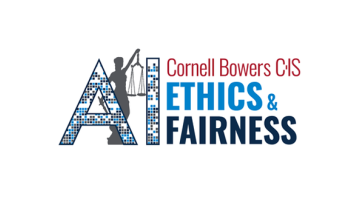Cornell University’s Bowers CIS Leads Efforts in Ethical AI through Research and Education
From platforms that screen mortgage applications and résumés to predicting the likelihood defendants will re-offend, AI systems and the algorithms behind them are relied on to make quick and efficient decisions in areas with major consequences, including healthcare, hiring, and criminal justice.
Though the potential for AI is immense, its early adoption has been beset by recurring challenges: a home-loan processing algorithm was far more likely to deny applications from people of color than white applicants; hiring algorithms meant to screen applicants are increasingly being used without a hard look under the hood and AI-powered software used by the U.S. criminal justice system was twice as likely to falsely predict future criminality in black defendants as white defendants.
Now more than ever – at the dawn of an artificial intelligence (AI)-assisted future, Cornell’s leadership in AI and in areas of ethics and fairness in technology is both guiding the development of better, fairer AI and shaping the minds of future AI innovators.
“In Cornell Bowers CIS, we’re really benefiting from how close the connections are between areas that, on the surface, seem quite disparate – computer science, information science, statistics, economics, sociology, law and science and technology studies,” said Jon Kleinberg ’93, the Tisch University Professor of Computer Science. “These areas have been brought together under Bowers CIS by this shared interest in the impact that technology is having on society.”
As a leader in developing responsible AI, Cornell Bowers CIS is uniquely positioned to guide tomorrow’s innovators as they dive deeper into issues of ethics, fairness and privacy, while weighing the policy implications of technological advances. World-class research, collaboration and education are written in Cornell Bowers CIS’s DNA. Formed decades ahead of its time in 1999, Cornell Bowers CIS was one of the first academic entities to foresee the coming technological age and then organize to meet it collaboratively, drawing on the expertise of pioneers in each of its three departments – computer science, information science and statistics and data science.

